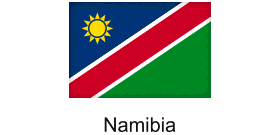 Namibia expects over 500 000 Tourists
Namibia expects over 500 000 Tourists
Despite the Covid-19 wreckage that gobbled the tourism industry globally, the international tourist arrival trends to Namibia from January to December 2021 indicate regaining 37.81% of the lost market when compared to 2020 figures, and 2022 is showing continued increases in arrivals.
As with almost all other countries, tourism in Namibia has been hit hard by the Covid-19 pandemic. The sector suffered a decline in international tourist arrivals of around 90% in 2020. Speaking during the World Economic Forum meeting in Davos, Switzerland, last week, tourism minister Pohamba Shifeta said the final total international arrivals for the year 2022 are expected to increase to above the 500 000 international travellers mark - up from 354 508 arrivals recorded in 2021, although this remains well down on the over 1.5 million arrivals in 2019.
Shifeta, however, highlighted travel and tourism as a key economic sector in Namibia.
Up to 2020, he said, the tourism sector has shown continued growth, and it is a priority sector for development in our Fifth National Development Plan (NDP5) and the Harambee Prosperity Plan I and II.
"It is a productive sector that can increase its contribution to the national gross domestic product and enhance the country's economic development and employment creation opportunities through increased investments. The total contribution of travel and tourism to GDP was estimated as 15.8% in 2019 (USD 1.7 billion) and as 9.8% in 2020 (USD 1 billion) of the total economy," he noted.
He informed investors the potential for investment in tourism in Namibia is immense.
This includes opportunities to invest in hotels and lodges as well as in tourism-related activities, such as conferencing, hunting, adventure tourism, sports and cultural tourism.
An established framework is also in place for joint venture partnerships with local communities.
"The fundamentals for investment in Namibia are well established and sound. Namibia is one of the most stable democracies in Africa, and it has enjoyed peace and stability in its 32 years of independence. The country is home to world-class technology and communication infrastructure, air and ground transport, ports and modern financial services and systems," Shifeta said.
Notably, he said, the pandemic has offered the government the opportunity to improve the enabling framework for rebooting the overall sector. On a general level, he indicated, there has been improvement in the overall business environment in the country as a result of government policy interventions offering specific support to enterprises, improving the ease of doing business, providing incentives to investors and prioritising an investor-driven openness approach to economic growth and development.
Specific to tourism, he said, recovery, growth and expansion are being prioritised through, amongst others, private-public sector investments and partnerships; improving the destination price competitiveness; perfecting environmental sustainability through robust policy frameworks; enhancing tourist services infrastructure; utilising the immense cultural resources, and promoting business travel.
Progressively, the government, through the environment ministry, is aligned with the World Health Organisation (WHO) on the importance of engaging in safer travel protocols rather than stopping travel altogether and supporting livelihoods that are dependent on travel and tourism economies.
